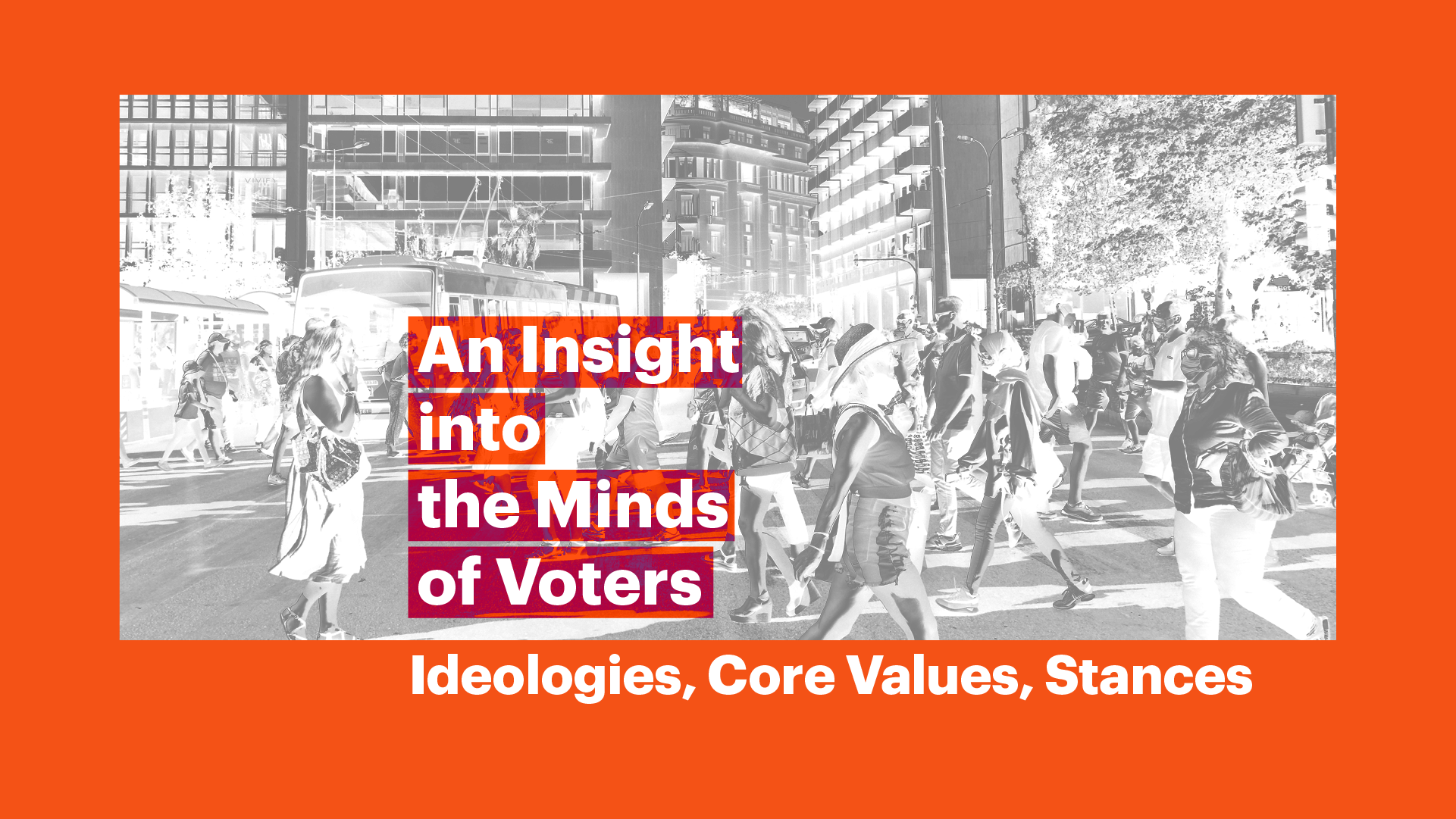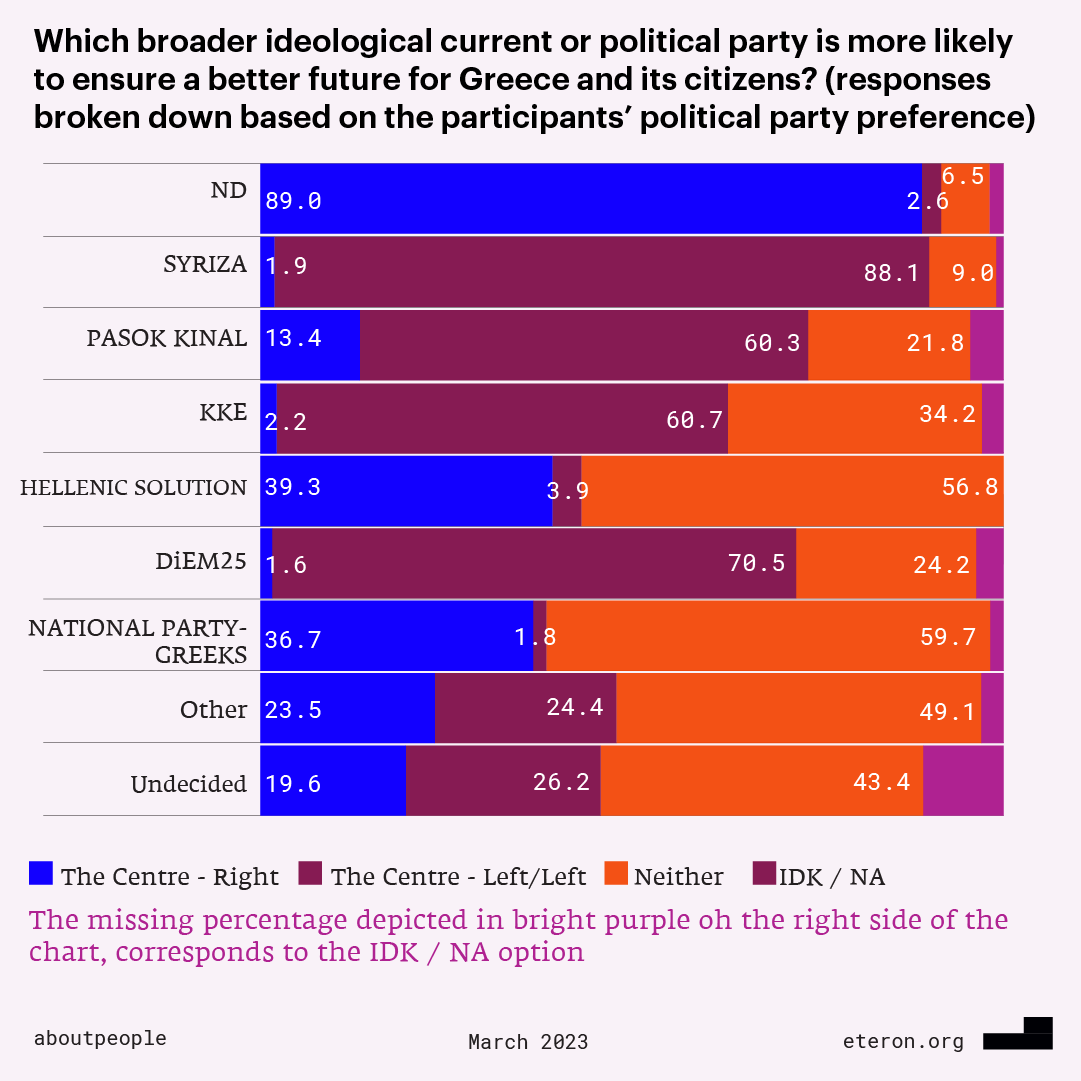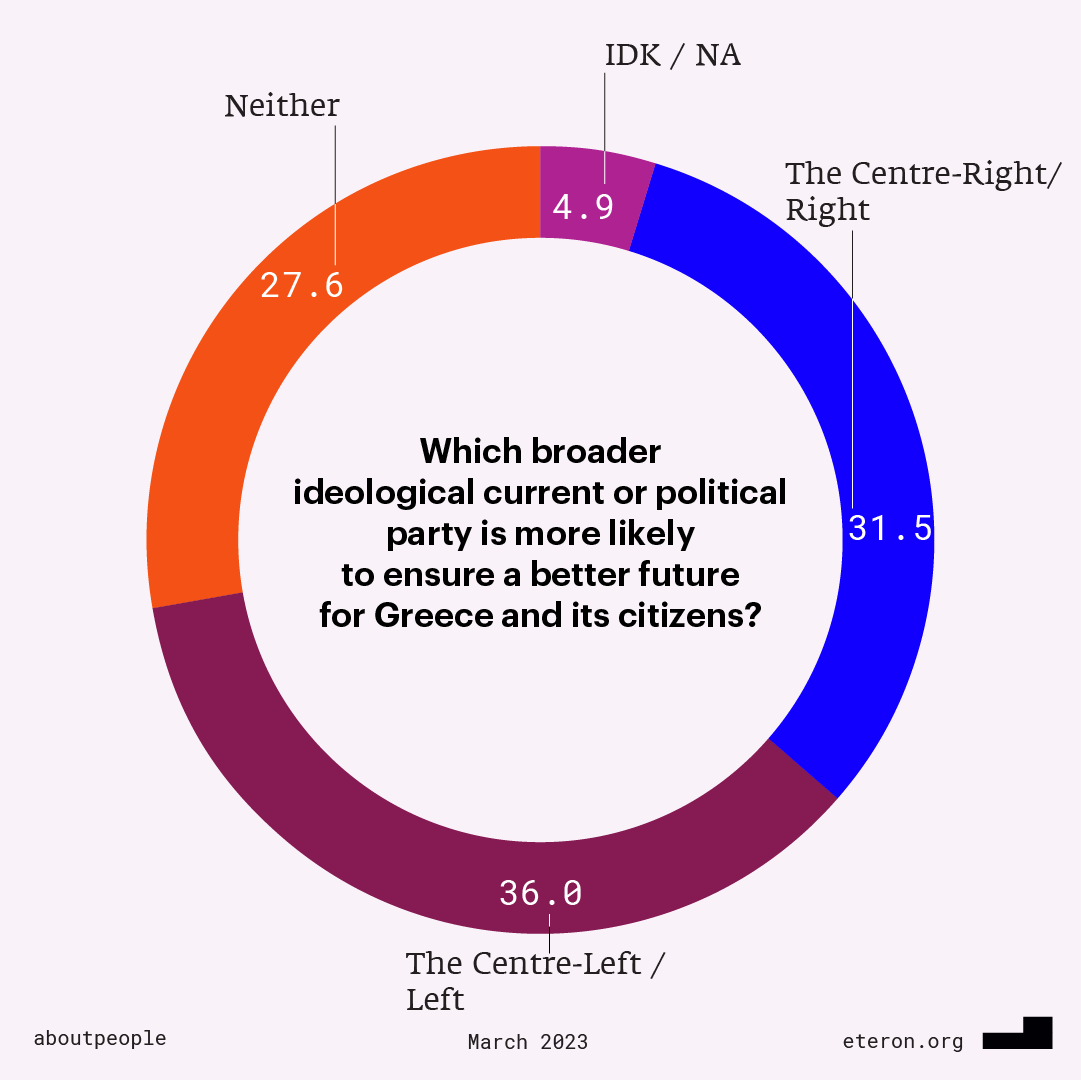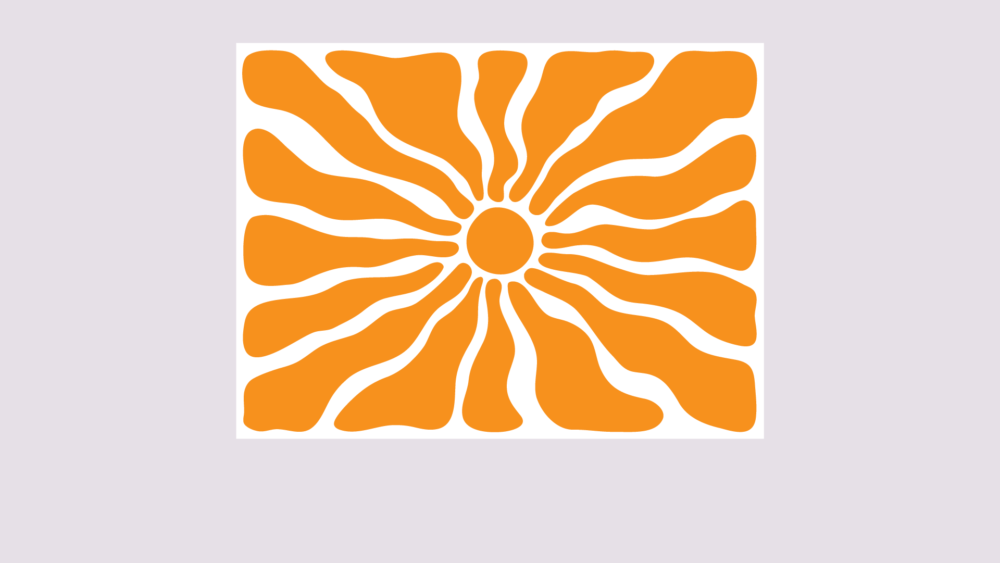
Research Analysis | An Insight into the Minds of Voters
Research goals. Eteron’s large-scale research conducted in collaboration with aboutpeople took place in the run-up to the 2023 elections. It is, however, rather different than the surveys that we usually see in the media. It is not a standard political poll and doesn’t focus solely on the brief period of the elections or on the power balance between the political parties. Nor does it aim to record voting intentions or to capture people’s views on specific current affairs. It delves into the Greeks’ views on politics, institutions, democracy, and the major ideological and values issues that have long been the subject of public debate. Its focus is detecting the citizens’ preferences and providing an insight into the minds of individual voters.
Thanks to its large sample of 4182 participants, it is possible to break down the responses according to party preference.
The research analysis is available in pdf format (in Greek).
SUMMARY OF THE RESEARCH’S KEY FINDINGS
- Most people are dissatisfied with their financial situation, and there is a prevailing economic pessimism.
Parliamentary democracy has very high approval rates. - There is also a very high level of dissatisfaction with the way that the Hellenic Republic currently functions.
- All the core institutions that constitute the Greek political system register low levels of trust.
- An “anti-democratic” core of sorts, of more than 10% is discernible within the Greek political system. Its epicentre lies within the far Right end of the political spectrum.
- Nea Dimokratia (ND or New Democracy, right-wing) and PASOK (Panhellenic Socialist Movement, centre) are the two main systemic support pillars of the political system (although they are often in the minority).
- The vast majority of the Greek population is still pro-EU.
- Support towards a return to the drachma is a majority trend only amongst the voters of Elliniki Lisi (Hellenic Solution, far right) (71.4%) and of Ethniko Komma-Ellines (National Party – Greeks, far right, nationalists) (57.8%).
- The Greek society’s ideological centre of gravity is positioned in the broader Centre-Left/Left.
- Most citizens feel that the distinction between Left and Right is not relevant in the present day and age.
- However, the Left-Right divide significantly structures the population’s economic interests and cultural choices. It does not, however, form two “factions” (in the ideological rather than the partisan sense) that are internally coherent or have distinct identities.
- The supporters of the Hellenic Solution and the National Party-Greeks differentiate themselves from the rest of the parties, clearly placing themselves outside the Right-Left division.
- With regard to the views of the voters, the Centre-Left/ Left is more divided organisationally and party-wise than the Centre-Right/Right. However, it is more coherent ideologically.
- Within the Centre-Right, however, the ideological differences between New Democracy and the parties placed to its right in terms of the spectrum are highly and decisively divergent.
- The New Democracy Party is ideologically diverse. It is the most preeminent “pro-Europe party” (along with PASOK) in the Greek political scene. It is also the party of the economically “satisfied” within the Greek political system – a fact that reduces its social diversity. According to the views of its current voters, it is the main voice for neo-liberal ideas in the country, a voice that is combined with powerful elements of cultural conservatism.
- The SYRIZA (left-wing) electorate is similarly ideologically diverse, albeit to a lesser extent. Within it, the group of the economically satisfied is significantly underrepresented, while the group of the economically dissatisfied predominates to a surprising degree.
- Both ideologically and sociologically, SYRIZA has a classic left-wing, diverse profile, with a particularly limited reach to the more affluent groups of the population, considering that it is a major party that aims to return to government. Also impressive, for such a party, is the strong support of its electorate for cultural liberalism.
- PASOK is in between ND and SYRIZA, both sociologically and ideologically-politically. When it comes to welfare state issues in particular, it leans more towards the Left, while on institutional matters it is slightly closer to New Democracy. Overall, the ideological profile of the current PASOK-KINAL electorate is slightly more Centre-Left than the mainstream opinion surveys suggest.
- DiEM25 constitutes, on the whole, a more ideologically and politically left-wing version of SYRIZA, rather than an anti-systemic left-wing force of “rupture”. It is the party of cultural liberalism in Greece, as its voters’ positions are more forward-looking than those of all other parties.
- The electorate of the Communist Party of Greece (KKE), pushing the ideas of Communism and Democratic Socialism, suggests a party with a clear classical Left profile. Overall, it is a moderately culturally liberal party. What is striking is that this particular electorate, although they’re generally Eurosceptics, appear to be split three ways when it comes to choosing whether they’d rather remain in the Eurozone or leave it.
- The Radical Right or Far Right is not homogeneous. Nationalism, anti-immigrant stances, generalised anti-systemicism, widespread distrust towards the EU, strong cultural conservatism and the presence of anti-democratic cells are elements that are found in both the electorate of the Hellenic Solution as well as that of the National Party-Greeks.
- However, between the voters of the Hellenic Solution there is wide ideological divergence and an apparent lack of ideological coherence. In contrast, the National Party-Greeks’ electorate is more cohesive, clearly nationalistic, more culturally conservative and more anti-democratic than that of the Hellenic Solution.
- The pattern that emerges based on the set of responses related to cultural liberalism/conservatism themes, allows us to classify party voters along a horizontal axis of cultural liberalism/conservatism in the following order: DiEM25, SYRIZA, KKE, PASOK, ND, Hellenic Solution, National Party-Greeks.
CONSIDERABLE ADDITIONAL FINDINGS
Personal financial situation, expectations
Of the survey population as a whole, 15.2% are very or rather satisfied with their current economic situation, 24.5% are neither satisfied nor dissatisfied and 60.1% are rather or very dissatisfied. The predominant feeling towards the population’s economic situation is that of dissatisfaction.
Within this context of generalised dissatisfaction, the electorate of ND differs decisively from that of SYRIZA. The “satisfied” are significantly overrepresented in the ND electorate (37% compared to only 15.2% in the entire population). Also overrepresented within its current electorate is the group that is “neither satisfied nor dissatisfied” (35.8% compared to 24.5%), while the “dissatisfied” are considerably underrepresented (only 26.9% compared to 60.1% among the entire sample).
The contrast with the compositions of SYRIZA’s voters is striking. In SYRIZA, the group of those who are satisfied is significantly underrepresented (only 5.1% compared to 37% of “satisfied” ND voters) and the same goes for those who are “neither satisfied nor dissatisfied” (15.1% compared to 35.8% among New Democracy voters), while the “dissatisfied” are by far the predominant group among the SYRIZA electorate (79.6% compared to only 26.9% in the New Democracy).
Therefore, when it comes to the personal financial situation of the participants, the electorate of New Democracy and that of SYRIZA are clearly distinct from one another as well as from the total population. The difference between the potential voters of New Democracy and those of SYRIZA is so pronounced that it justifies the image of “two contrasting worlds”.
The replies to the question regarding people’s expectations of improvement in their personal financial situation over the next 12 months confirm – and therefore reinforce – the picture painted above. The “optimists” are significantly overrepresented within the ND electorate (39.6% vs. 20.1% in the population as a whole) while those who are pessimistic regarding their economic future are dramatically underrepresented: they amount to just 11.8% of the ND voters, while within the population as a whole, that percentage is as high as 40%.
The picture is reversed within the potential SYRIZA electorate, where we see a significant under-representation of “optimists” (10.3% compared to 20.1% in the population as a whole) and a significant over-representation of people who feel pessimistic about their economic prospects (57.3% compared to 40% in the population as a whole).
When it comes to class self-placement, it makes sense that the presence of the upper and “middle to upper” class (8.6% vs. 5.2% in the general population) as well as that of the middle class (64.7% vs. 47.9%) is much stronger among ND voters, while the middle to lower class (22.8% against 35.4% in the general population) and – even more so – the lower class (just 2.9% against 9.7%) are underrepresented. The reverse pattern of under- and over-representation characterises the potential SYRIZA electorate.
Compared to the very different profiles that compose the electorates of ND and SYRIZA, the PASOK voters appear – in all three previous questions – much closer to the overall population’s average (see detailed findings).
The participants who stated that they will vote for KKE are more likely than the voters of all the other parties to place themselves in the middle to lower (50.1%) or even the lower economic class (20.9%).
Perhaps an ideological – or even romantic – predisposition, inspired by the old “working class” may partly explain this class self-placement. Potential voters of the two parties to the right of ND also express a very high degree of economic dissatisfaction and pessimism. However, the Hellenic Solution voters are clearly more dissatisfied and pessimistic compared to those of the National Party-Greeks.
Democracy and institutions
Parliamentary democracy has very high approval rates, with 83% of citizens agreeing that it is the best regime (while 13.3% disagree). The highest approval rates are found among voters of ND (94%), PASOK (94%), SYRIZA (88.4%) and DiEM25 (87.3%).
The lowest are found among voters of the Hellenic Solution (67.7%), the KKE (62.1%), and the National Party-Greeks (54.8%).
At the same time, elaborating on this dominant democratic imaginary, the overwhelming majority (84.9%) does not agree with the statement that “in certain cases dictatorship could be preferable to democracy”.
SYRIZA (95.1%), DiEM25 (93.4%) and KKE (91.6%) voters express the most widespread and unambiguous disagreement with this statement. However, 58% of the voters of the National Party, 33.3% of those of the Hellenic Solution and – interestingly – 14.2% of the voters of ND support this position. The same goes for 22.9% of those who would vote for “other parties”.
Therefore, a not inconsiderable nucleus of about 13% of the total electorate could, “in certain cases”, endorse undemocratic solutions. This nucleus is predominantly located on the right and the far right of the political spectrum. Its core consists of the majority of National Party-Greeks’ voters and one third of Hellenic Solution’s voters.
Overall, parliamentary democracy, as a regime, enjoys a high level of support. However, while the vast majority support it, only a minority (29.9%) is satisfied with the way democracy actually functions in Greece (69.7% express dissatisfaction). It is worth noting that New Democracy voters clearly deviate from the prevailing stance of dissatisfaction, since most of them (75.4%) express satisfaction with the way Greek democracy functions. PASOK-KINAL voters also demonstrate a distinct stance: although, overall, they share the generalised feeling of dissatisfaction, they also express a higher than average percentage of satisfaction (40.7%, compared to just 29.9% of the total population).
It is worth noting that 78.6% of respondents believe that democracy would be better “if citizens were more actively engaged in its processes through popular assemblies and referendums”. Here too, the differentiation of ND voters is considerable (52.9% are in favour of this approach).
Citizens show low levels of trust in all the institutions that make up the political system (see Detailed Findings). The lack of trust is pronounced and quite widespread. It also concerns more “neutral” institutions, such as Justice (69% have little or no trust in it), the Presidency of the Republic (63.7%) and Independent Authorities (65.1%) or institutions that are inherently pluralistic, such as the Parliament (68.9%).
The pattern that reflects the voters’ views on all issues concerning either the overall functioning of Greek democracy or, more specifically, the core institutions of the political system is the following: New Democracy voters express the greatest confidence, or the least distrust, followed by those of PASOK. These two electorates constitute the two systemic support pillars of the political system (although they are often in the minority).
In contrast, voters of all the opposition parties (except those of PASOK) express massive distrust towards political institutions.
This is also true for voters of the three left-wing parties, including the “systemic” SYRIZA. The research data leave no doubt as to the fact that the perception of distrust is both very high and largely linked to the government-opposition distinction. Nevertheless, it is the voters of the National Party-Greeks who express the most systematic distrust towards all the Greek political institutions.
European Union/ Euro
Typically, about two out of three voters (64.9%) believe that the overall evaluation of Greece’s participation in the EU is positive, while 32% of voters evaluate the country’s participation in the European endeavour negatively. 69.4% are in favour of remaining in the Eurozone, 20.9% would rather return to the drachma and 9.7% do not express an opinion.
In terms of their attitude towards the EU, the electorate is divided into three parts. The voters of ND (94.4%) and PASOK (84.5%) are the two electorates that are most positive about the country’s European course. Based on their voters’ stance, ND and PASOK are the two “pro-Europe parties” within the Greek political scene. The voters of SYRIZA (59.4%), DiEM25 (51.9%), “other parties” (55.2%) as well as undecided voters (61.1%) constitute a second electoral group that in majority – though in lower numbers than the first group – has a positive opinion regarding Greece’s European track.
In contrast, the voters of Hellenic Solution (70.4%), the KKE (69.3%) and the National Party (68.5%) form the epicentre of Euroscepticism (or even “anti-Europeanism”) in the country.
A similar pattern can be observed on the crucial issue of whether or not the country should remain in the Eurozone. The option to remain appears to be stronger among SYRIZA (68.7%) and DiEM25 (58.4%) voters, compared to the majoritarian but rather weaker positive assessment of the country’s overall European course by the same voters.
Surprisingly, the potential voters of KKE are split into three groups on this particular matter, with the option “it would be better to remain in the Eurozone” having a small lead (39.7%) over the one that says “we should return to the drachma” (32.9%) and the option “I don’t know/NA” (27.4%).
Therefore, the return to the drachma is the majority’s choice only in the case of the Hellenic Solution (71.4%) and National Party-Greeks (57.8%). In this respect, the Greek electorate seems to adopt a stance close to that observed in many European countries.
The Greeks’ ideological centre of gravity leans towards the Centre-Left/Left.
In terms of the citizens’ general ideological stance or identity, the currents/ideologies/ideas that ranked highest were Liberalism/Democratic Centre (19.7%), Social Democracy (18.2%) and Democratic Socialism (16%), followed by Neoliberalism (7.3%), Nationalism (6.1%), Ecology (5.4%), Communism (5.1%) and Conservatism (3.5%). The overall picture leaves no doubt: the ideological centre of gravity of Greek society is positioned in the broader Centre-Left/Left.
Thus, it is no coincidence that for 36% of the citizens, the Centre Left/Left is the ideological current/party that “could ensure a better future for Greece and its citizens”, while the corresponding percentage for the Centre Right/Right is limited to 31%.
As expected, voters of SYRIZA, DiEM25, PASOK and KKE opt for the Centre-Left/Left by more than 60% (SYRIZA: 88.1%).
Similarly (though on the opposite end of the spectrum), the vast majority of ND voters (89%), as well as those of the Hellenic Solution (39.3%) and the National Party-Greeks (36.7%), express their preference for the Right / Centre-Right. It is worth noting, however, that most of the voters of the two Far Right parties (56.8% and 59.7% respectively) chose the “neither (current/party)” option, clearly differentiating themselves -despite their stronger but minority inclination towards the Right- from the Right-Left division.
Political parties and the ideological choices of their voters.
The ideological attributes that are more suited to the voters of ND are Liberalism/Democratic Centre (44.3%) and Neo-Liberalism (23.6%). Notably, the term Liberalism/Democratic Centre is now, though not exclusively, part of the political terminology favoured by the wider Right/Centre-Right (see ETERON’s research on Economic Justice). Overall, the ideological profile of the ND electorate is rather diverse.
Interestingly, there are very low levels of identification with conservatism (just 7.3%) and nationalism (3.6%). Also, there is a significant influence of ideological “identities” with a more left-wing dimension (Social Democracy: 6.6%, Democratic Socialism: 3.2%, Ecology: 2.4%, in total: 12.2%).
SYRIZA’s ideological synthesis is similarly diverse, albeit to a lesser extent. The majority of its voters identify with the ideals of Democratic Socialism (40.4%) and Social Democracy (30.6%). It is worth noting that only 7.3% of SYRIZA’s potential voters associate their ideology with communism, despite the party’s communist origins (respectively: KKE: 47.7%, DiEM25: 7.4%).
More specifically, more than a third of the current voters of the opposition party choose ideological “identities” with moderate and non-radical traits ( for instance, Social Democracy: 30.6%, Liberalism/Democratic Centre: 4.1%). The above is reinforced by the fact that 52.8% of SYRIZA’s voters believe that “moderation” represents “something good” (compared to 36.4% who believe the opposite).
The ideological profile of PASOK-KINAL is particularly interesting. The majority of the voters identify with Social Democracy (56.3%), while Democratic Socialism (14.4%) and Liberalism/Democratic Centre (13%) complete a profile that is diverse but clearly focused on the Centre-Left. Based on these “comprehensive” ideological identities rather than on policy decisions applied in day-to-day politics, the ideological composition of today’s PASOK-KINAL voters is altogether more Centre-Left than current polls suggest.
The electorate of KKE, with a strong focus on Communism (47.7%) and Democratic Socialism (22.5%), shows a clearly shaped left-wing profile. However, even the Communist Party, in times when traditional associations seem to be loosening, is characterised by an ideological diversity, albeit limited, as 15.2% of its voters “identify” with Social Democracy and 4.2% with Liberalism/Democratic Centre.
As far as the Radical Right is concerned, there is a clear differentiation between the National Party-Greeks, which is strongly focused on Nationalism (58%) and, to a lesser extent, on Conservatism (7.6%), and the Hellenic Solution, whose voters, despite the fact that 24.2% of them identify with Nationalism, there seems to be a great ideological dispersion and an obvious lack of ideological coherence. A remarkable finding, in this question, is the high percentage of “IDK/NA”, which constitutes the second most popular answer (Hellenic Solution 21.6%, Greeks: 12.2%) within the respective electorates.
Voters and the Right/ Left divide
58.3% of the participants believe that the distinction between the Left and the Right is not relevant anymore, while 36.1% consider it to be important.
Only the voters of left-wing parties consider in their majority, or relative majority, that the Left/Right divide is still important: namely SYRIZA (62.7%), DiEM25 (52.4%) and KKE voters (49.7%). Interestingly, only 37% of the PASOK-KINAL voters consider said distinction to be significant.
The supporters of the Hellenic Solution (8.8%) and the National Party-Greeks (19.2%) differentiate themselves from all the other parties, placing themselves, distinctly, outside this traditional divide. It is significant that in a similar question, 83.2 % of the voters of the Hellenic Solution and 60.3 % of the Greeks’ electorate, picked the option “ am proud that my views integrate the good elements of the Right and the Left, though I do not identify with either side”.
The electorates of SYRIZA and KKE are the only ones that in their majority claim that they are proud of their left-wing identity (57.2% and 58.6% respectively). Yet a rather significant 32.7% of SYRIZA voters and 28.7% for the KKE electorate chose the answer “I am proud that my views integrate the good elements of the Right and the Left.
A mixed economic culture with prevalent left-wing ideas
In terms of economic policy, a significant majority (64.5% of all participants) believe that the State should be more involved in the Greek economy “in order to create better conditions for economic growth”, while 26.9% believe that privately owned businesses are the main vehicle for economic growth. This is a cross-party majority, with the exception of ND voters (48.9% of which are in favour of the central role of private businesses compared to 45% who see the State as the central agent for economic growth).
It is striking that most citizens (62.7%) believe that defence spending should be reduced in order for the State to focus more on sectors such as health, education and social security. Admittedly, it has to be pointed out that the research was carried out during a period when relations with Turkey are not strained. Still, 27.4% of the population believe that the defence budget should be increased in order to better protect national integrity.
It is worth noting that, on this topic, the majority’s position is not the predominant one amongst voters of all the political parties. In addition to the ND electorate (58.9%), that of the Hellenic Solution (60%) and the National Party-Greeks (55.3%) are in favour of increasing defence spending, thus invoking, on this sensitive national issue, the traditional Right-Left reflexes.
Modernisation and the welfare state are the most popular “notions” (87.9% and 87.7% respectively) and enjoy broad support across all parties. Some key aspects of a more neo-liberal economic approach, such as competitiveness (77.9%), foreign investment (68.2%), and the market economy (54%) also receive particularly high ratings. These majority views are also shared by a considerable percentage of potential Centre-Left and Left voters. Yet, an indicative expression of the population’s non-coherent economic culture is that while they “like” the above notions, terms such as privatisation (31%), multinationals (30.1%) and capitalism (24.1%) score really low.
The ND electorate has displayed the strongest internal coherence and consistency in the positive evaluation of terms and notions associated with liberal economics. In contrast, the voters of the two parties to the right of ND do not follow the above pattern at all. Their disassociation from the Right-Left axis is extremely evident in economic matters as well.
Cultural Liberalism and Conservatism, Rights
There are significant differences between voters of the left and centre-left parties (KKE, DiEM25, SYRIZA, PASOK) and those of the right and centre-right parties (ND, Hellenic Solution, National Party-Greeks) on issues concerning “social progressivism” and “social conservatism”. The dipole of cultural liberalism and cultural conservatism constructs largely opposing views and stances.
In the first subsection focusing on so-called “law and order” matters, 47.3% of the people argue that the right to assemblies and demonstrations should be restricted when there is a threat to public order, while 49.5% are against such a measure. Moreover, two out of three participants believe that policemen are excessively violent during rallies and protests.
Voters of the ruling party are the ones that are most in favour of restricting demonstrations when there is a threat to public order, by an impressive 86.7%. Voters of PASOK (52%), Hellenic Solution (60.4%) and National Party-Greeks (61.8%) also lean towards the same position. In contrast, left-wing parties (except PASOK) disagree en masse with the above restriction (SYRIZA: 81.1%, KKE: 78.3%, DiEM25: 83.0%).
]Regarding police brutality, all opposition parties, to a greater or lesser extent, share the view that the police are extremely violent during demonstrations and rallies. It is no coincidence that the highest percentages are recorded among the electorate of DiEM25 (96.4%), SYRIZA (93.0%) and KKE (91.1%). In contrast, only ND voters (62.1%) disagree with the view that the police are too violent during rallies/demonstrations.
The general population is against the reintroduction of the death penalty for certain crimes (52.6%), while 44.2% would support such a reform. More specifically, voters of parties positioned on the right of the political continuum are in favour of the death penalty: ND: 54.1%, Hellenic Solution: 67.9%, National Party-Greeks: 76.5%.
This pattern of positioning can be observed with regard to many “cultural” topics.
Indicatively, 58.8% of SYRIZA voters, 51.3% of DiEM25, 50.8% of KKE and 46.3% of PASOK stated that the presence of immigrants has benefited Greece more than it has burdened it. Left-wing voters are followed by the undecided (34.7%) and ND voters (32%), while only a tiny fraction of those who would vote for the Hellenic Solution (9.7%) and the National Party (8%) stated they agree with the statement above.
Without elaborating extensively on the findings, we will set out the general direction.
The pattern that emerges from the set of responses related to cultural liberalism/conservatism issues allows for a classification of the voters along an imaginary horizontal axis of cultural liberalism-conservatism in the following order: DiEM25, SYRIZA, KKE, PASOK, ND, Hellenic Solution, National Party-Greeks.






